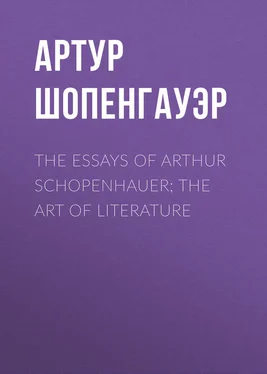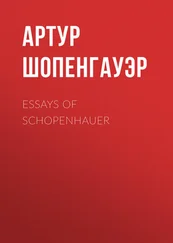Артур Шопенгауэр - The Essays of Arthur Schopenhauer; The Art of Literature
Здесь есть возможность читать онлайн «Артур Шопенгауэр - The Essays of Arthur Schopenhauer; The Art of Literature» — ознакомительный отрывок электронной книги совершенно бесплатно, а после прочтения отрывка купить полную версию. В некоторых случаях можно слушать аудио, скачать через торрент в формате fb2 и присутствует краткое содержание. Жанр: Философия, literature_19, foreign_antique, foreign_prose, на английском языке. Описание произведения, (предисловие) а так же отзывы посетителей доступны на портале библиотеки ЛибКат.
- Название:The Essays of Arthur Schopenhauer; The Art of Literature
- Автор:
- Жанр:
- Год:неизвестен
- ISBN:нет данных
- Рейтинг книги:3 / 5. Голосов: 1
-
Избранное:Добавить в избранное
- Отзывы:
-
Ваша оценка:
- 60
- 1
- 2
- 3
- 4
- 5
The Essays of Arthur Schopenhauer; The Art of Literature: краткое содержание, описание и аннотация
Предлагаем к чтению аннотацию, описание, краткое содержание или предисловие (зависит от того, что написал сам автор книги «The Essays of Arthur Schopenhauer; The Art of Literature»). Если вы не нашли необходимую информацию о книге — напишите в комментариях, мы постараемся отыскать её.
The Essays of Arthur Schopenhauer; The Art of Literature — читать онлайн ознакомительный отрывок
Ниже представлен текст книги, разбитый по страницам. Система сохранения места последней прочитанной страницы, позволяет с удобством читать онлайн бесплатно книгу «The Essays of Arthur Schopenhauer; The Art of Literature», без необходимости каждый раз заново искать на чём Вы остановились. Поставьте закладку, и сможете в любой момент перейти на страницу, на которой закончили чтение.
Интервал:
Закладка:
Arthur Schopenhauer
The Essays of Arthur Schopenhauer; The Art of Literature
The contents of this, as of the other volumes in the series, have been drawn from Schopenhauer's Parerga , and amongst the various subjects dealt with in that famous collection of essays, Literature holds an important place. Nor can Schopenhauer's opinions fail to be of special value when he treats of literary form and method. For, quite apart from his philosophical pretensions, he claims recognition as a great writer; he is, indeed, one of the best of the few really excellent prose-writers of whom Germany can boast. While he is thus particularly qualified to speak of Literature as an Art, he has also something to say upon those influences which, outside of his own merits, contribute so much to an author's success, and are so often undervalued when he obtains immediate popularity. Schopenhauer's own sore experiences in the matter of reputation lend an interest to his remarks upon that subject, although it is too much to ask of human nature that he should approach it in any dispassionate spirit.
In the following pages we have observations upon style by one who was a stylist in the best sense of the word, not affected, nor yet a phrasemonger; on thinking for oneself by a philosopher who never did anything else; on criticism by a writer who suffered much from the inability of others to understand him; on reputation by a candidate who, during the greater part of his life, deserved without obtaining it; and on genius by one who was incontestably of the privileged order himself. And whatever may be thought of some of his opinions on matters of detail – on anonymity, for instance, or on the question whether good work is never done for money – there can be no doubt that his general view of literature, and the conditions under which it flourishes, is perfectly sound.
It might be thought, perhaps, that remarks which were meant to apply to the German language would have but little bearing upon one so different from it as English. This would be a just objection if Schopenhauer treated literature in a petty spirit, and confined himself to pedantic inquiries into matters of grammar and etymology, or mere niceties of phrase. But this is not so. He deals with his subject broadly, and takes large and general views; nor can anyone who knows anything of the philosopher suppose this to mean that he is vague and feeble. It is true that now and again in the course of these essays he makes remarks which are obviously meant to apply to the failings of certain writers of his own age and country; but in such a case I have generally given his sentences a turn, which, while keeping them faithful to the spirit of the original, secures for them a less restricted range, and makes Schopenhauer a critic of similar faults in whatever age or country they may appear. This has been done in spite of a sharp word on page seventeen of this volume, addressed to translators who dare to revise their author; but the change is one with which not even Schopenhauer could quarrel.
It is thus a significant fact – a testimony to the depth of his insight and, in the main, the justice of his opinions – that views of literature which appealed to his own immediate contemporaries, should be found to hold good elsewhere and at a distance of fifty years. It means that what he had to say was worth saying; and since it is adapted thus equally to diverse times and audiences, it is probably of permanent interest.
The intelligent reader will observe that much of the charm of Schopenhauer's writing comes from its strongly personal character, and that here he has to do, not with a mere maker of books, but with a man who thinks for himself and has no false scruples in putting his meaning plainly upon the page, or in unmasking sham wherever he finds it. This is nowhere so true as when he deals with literature; and just as in his treatment of life, he is no flatterer to men in general, so here he is free and outspoken on the peculiar failings of authors. At the same time he gives them good advice. He is particularly happy in recommending restraint in regard to reading the works of others, and the cultivation of independent thought; and herein he recalls a saying attributed to Hobbes, who was not less distinguished as a writer than as a philosopher, to the effect that " if he had read as much as other men, he should have been as ignorant as they ."
Schopenhauer also utters a warning, which we shall do well to take to heart in these days, against mingling the pursuit of literature with vulgar aims. If we follow him here, we shall carefully distinguish between literature as an object of life and literature as a means of living, between the real love of truth and beauty, and that detestable false love which looks to the price it will fetch in the market. I am not referring to those who, while they follow a useful and honorable calling in bringing literature before the public, are content to be known as men of business. If, by the help of some second witch of Endor, we could raise the ghost of Schopenhauer, it would be interesting to hear his opinion of a certain kind of literary enterprise which has come into vogue since his day, and now receives an amount of attention very much beyond its due. We may hazard a guess at the direction his opinion would take. He would doubtless show us how this enterprise, which is carried on by self-styled literary men , ends by making literature into a form of merchandise, and treating it as though it were so much goods to be bought and sold at a profit, and most likely to produce quick returns if the maker's name is well known. Nor would it be the ghost of the real Schopenhauer unless we heard a vigorous denunciation of men who claim a connection with literature by a servile flattery of successful living authors – the dead cannot be made to pay – in the hope of appearing to advantage in their reflected light and turning that advantage into money.
In order to present the contents of this book in a convenient form, I have not scrupled to make an arrangement with the chapters somewhat different from that which exists in the original; so that two or more subjects which are there dealt with successively in one and the same chapter, here stand by themselves. In consequence of this, some of the titles of the sections are not to be found in the original. I may state, however, that the essays on Authorship and Style and the latter part of that on Criticism are taken direct from the chapter headed Ueber Schriftstellerei und Stil ; and that the remainder of the essay on Criticism , with that of Reputation , is supplied by the remarks Ueber Urtheil, Kritik, Beifall und Ruhm . The essays on The Study of Latin , on Men of Learning , and on Some Forms of Literature , are taken chiefly from the four sections Ueber Gelehrsamkeit und Gelehrte, Ueber Sprache und Worte, Ueber Lesen und Bücher: Anhang , and Zur Metaphysik des Schönen . The essay on Thinking for Oneself is a rendering of certain remarks under the heading Selbstdenken. Genius was a favorite subject of speculation with Schopenhauer, and he often touches upon it in the course of his works; always, however, to put forth the same theory in regard to it as may be found in the concluding section of this volume. Though the essay has little or nothing to do with literary method, the subject of which it treats is the most needful element of success in literature; and I have introduced it on that ground. It forms part of a chapter in the Parerga entitled Den Intellekt überhaupt und in jeder Beziehung betreffende Gedanken: Anhang verwandter Stellen.
It has also been part of my duty to invent a title for this volume; and I am well aware that objection may be made to the one I have chosen, on the ground that in common language it is unusual to speak of literature as an art, and that to do so is unduly to narrow its meaning and to leave out of sight its main function as the record of thought. But there is no reason why the word
Читать дальшеИнтервал:
Закладка:
Похожие книги на «The Essays of Arthur Schopenhauer; The Art of Literature»
Представляем Вашему вниманию похожие книги на «The Essays of Arthur Schopenhauer; The Art of Literature» списком для выбора. Мы отобрали схожую по названию и смыслу литературу в надежде предоставить читателям больше вариантов отыскать новые, интересные, ещё непрочитанные произведения.
Обсуждение, отзывы о книге «The Essays of Arthur Schopenhauer; The Art of Literature» и просто собственные мнения читателей. Оставьте ваши комментарии, напишите, что Вы думаете о произведении, его смысле или главных героях. Укажите что конкретно понравилось, а что нет, и почему Вы так считаете.












